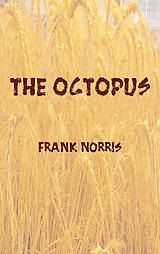
En el siguiente artículo se habla más extensamente de la novela.
The Octopusdeals primarily with the social conflicts arising out of the industrialisation of the USA. It places these relations between human beings within a larger context of the relationship of humans with nature in its totality, understood by Frank Norris as supernatural force; a turn of the nineteenth century precursor of what we might think of today as ecology. Thus Norris conceptualised The Octopus as the first part of a three-volume Epic of the Wheat. The Octopus focused on the production of wheat in California, while a second part, The Pit (1903) went on to describe the financial processes of speculation centred on the wheat exchange, or pit, in Chicago. A final volume (never completed, due to Norris's early death) was to be concerned with the export of wheat to feed the needy populations of the world. This overarching conception of the wheat as a natural force which would grow and be transported globally, whatever the needs, desires and plans of the human individuals who seek to control it, is woven into the novels' fabric.
The Octopus is based on the Mussel Slough incident, a land dispute between Californian farmers and the Southern Pacific Railroad, which culminated in the killing of eight men in a shootout. In economic and political terms, this was fairly insignificant in comparison with the violent repression of manual workers during the period. However, the conflict between farmers and railroad went to the heart of American capitalism's relation with land, always ideologically significant in the U.S.A., and never more so than in this period with the closure of the frontier in the 1890s, and the realisation in the same decade that the industrialised economy had come to dominate agriculture in the U.S. (...)
Para leerlo completamente visitar The Literary Encyclopedia
Labels: Literatura



0 Responses to “Pulpos y literatura -Frank Norris-”
Leave a Reply